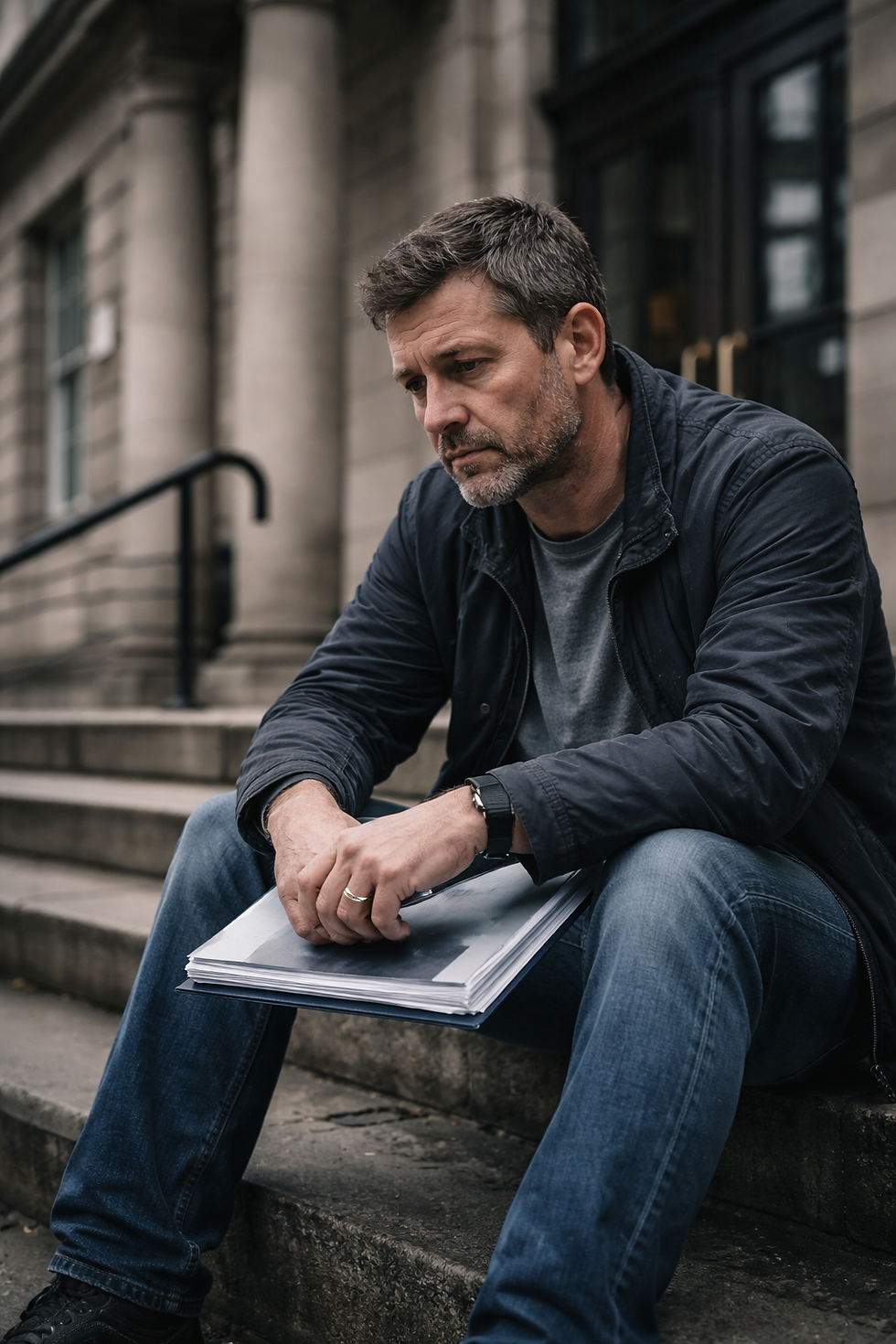When Caring Becomes a Cage: How Codependency Keeps Men in Abusive Relationships — and How the Falsely Accused Network Helps Break the Cycle
- Falsely Accused Network

- Oct 20, 2025
- 4 min read
By Michael Thompson, Founder – Falsely Accused Network
---
A Silent Pattern Behind Many False Allegations
At the Falsely Accused Network, we speak daily with men who find themselves in the most painful of situations often accused of domestic abuse, often by the very partners who have been abusing them.
It’s a tragic irony, but it’s also a pattern.
When we listen to their stories, the walking on eggshells, the fear of losing their children, the desperate attempts to “keep the peace” and one theme surfaces again and again: codependency.
It’s a word that makes many men uncomfortable, yet it explains so much about why good men stay in destructive relationships long after the warning signs have appeared.

---
What Codependency Really Means
The term codependency first appeared in the 1970s through Alcoholics Anonymous to describe those who became psychologically entangled in another’s addiction.
Today, psychologists use it more broadly.
Put simply, codependency is when your self-worth and sense of identity become tied to another person’s approval or stability.
It’s not about weakness , it’s about misplaced loyalty, often rooted in trauma, fear, or guilt.
Dr. Sal Raichbach, a clinical psychologist, notes that men often express codependency through rescuing behaviour: “Men tend to be rescuers more than women… they do too much for their spouse, friend, or family member.”
That need to rescue , to fix, to protect and can lead men to accept emotional, psychological, and sometimes physical abuse under the belief that love, patience, or self-sacrifice will eventually make things right.
---
Why Codependency Is So Common Among Men
From an early age, many men are taught to be strong, provide, and endure.
This conditioning makes it hard for men to see themselves as victims, especially of emotional or psychological abuse.
When relationships become toxic, they don’t run , they rationalise.
They say:
“She’s just under pressure.”
“I can handle it.”
“I’m staying for the children.”
These are compassionate motives but compassion becomes dangerous when it demands self-erasure.
Codependent men often:
Rescue their partners repeatedly, even when it reinforces the abuse.
Cover up for their partner’s lies, aggression, or instability.
Absorb guilt and blame, even for things they didn’t do.
Fear peace, mistaking calm for emptiness and conflict for connection.
Over time, this pattern traps men in cycles of control and dependency. They become emotionally exhausted, legally vulnerable, and socially isolated are easy targets for false allegations.
---
Codependency and the “Protector Trap”
For fathers, the situation is even more complex.
Many stay in abusive relationships to “protect the children” believing that leaving would mean never seeing them again or triggering retaliation.
This instinct is noble but tragic: it keeps men bound to the very environment that damages both them and their children.
We call this the Protector Trap — when love, responsibility, and fear of loss merge into paralysis.
And it’s this emotional state that abusers often exploit, manipulating fathers into compliance, guilt, or silence.
---
How the Falsely Accused Network Helps Without Enabling
At the Falsely Accused Network (FAN), we provide support for men facing false allegations, coercive control, and family-court trauma.
But there’s one principle we hold above all else:
We support men — we do not enable their codependency.
Our goal is to help men rebuild their lives, not remain trapped in unhealthy attachments.
That means we listen, we validate, and we empower, but we also encourage accountability, independence, and practical recovery.
Here’s how we approach it:
1. Emotional Support Without Emotional Dependence
We offer a confidential helpline and peer-support group where men can speak openly about their experiences.
But we’re clear that our role is not to become a permanent lifeline , it’s to help men stand on their own feet again.
2. Professional Referrals, Not Personal Fixes
Rather than playing therapist or lawyer ourselves, we connect men to qualified professionals:
Specialist solicitors and barristers who understand false allegation and family law.
McKenzie Friends for affordable court support.
Accredited counsellors and trauma-informed coaches for emotional healing.
These referrals are not about dependency , they’re about building a support network that restores autonomy.
3. Education About Boundaries and Recovery
Through articles, podcasts, and workshops, we teach men to recognise patterns of control, trauma bonding, and codependency.
Knowledge is the antidote to manipulation.
Once a man understands why he stayed, he can begin to choose differently.
---
From Rescue to Recovery
The difference between enabling and empowering is subtle but vital.
Enabling says: “You can’t cope without me.”
Empowering says: “You can do this, and here are the tools.”
We want every man who comes through the Falsely Accused Network to walk away with those tools — legal clarity, emotional insight, and a renewed sense of self-worth.
Because recovery from false allegations isn’t just about clearing your name — it’s about reclaiming your identity.
---
Breaking the Cycle
If you recognise yourself in these words — if you’ve stayed too long, given too much, or lost yourself in the hope of keeping peace — know this:
You are not weak. You are human.
Codependency isn’t love. It’s fear disguised as devotion.
And you can break free from it with the right help, clear boundaries, and honest self-reflection.
At the Falsely Accused Network, we’ll stand beside you — not to rescue you, but to help you rescue yourself.
---
Falsely Accused Network
📞 0204 538 8788
🌐 www.falselyaccusednetwork.co.uk
📧 support@falselyaccusednetwork.co.uk



Comments